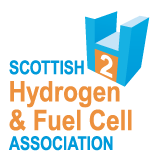A highly innovative trial involving SHFCA members Logan Energy and PlusZero will see the large tugs operating out of the Port of Leith in Edinburgh powered by green hydrogen when tied up. This green hydrogen will be produced from wastewater from SHFCA member Scottish Water’s nearby Seafield water treatment works, providing a fully green and sustainable solution.
Forth Port’s ‘Craigleith’ tug in the Port of Leith, Edinburgh (photo credit: Forth Ports)
Supported by Forth Ports, this highly innovative trial will see the large tugs operating out of The Port of Leith powered by green hydrogen when tied up. The green hydrogen will be produced from wastewater from Scottish Water’s nearby water treatment works at Seafield, Edinburgh.
A consortium of four Scottish renewable and maritime companies have been awarded a UK Government Department for Transport grant of over £535,000 to develop an innovative UK-first approach that will use clean, green hydrogen energy to reduce carbon emissions from vessels when berthed in port.
The year-long trial, run by partners Forth Ports, Waterwhelm, Logan Energy and PlusZero, will deliver a state-of-the-art demonstrator system for green hydrogen shore power which marine vessels can use when they are berthed, removing the need for the diesel-powered systems which are currently in use on some quaysides.
Bill Ireland, Chief Executive Officer of Logan Energy said: “Logan Energy’s fully integrated system approach will take green energy and Waterwhelm’s clean water supply and produce, compress, and store hydrogen for the purpose of powering PlusZero’s equipment, without producing any emissions. This will be a key demonstration within the marine sector that can be easily replicated elsewhere.”
David Amos, Managing Director at PlusZero added: “There is a huge amount of momentum behind hydrogen as an accelerator to the global energy transition. PlusZero’s ready-to-go clean power solution replaces the need for polluting diesel generators across multiple sectors of the economy - construction, events and production, and the industrial sectors.”
The project is part of the Clean Maritime Demonstration Competition Round 4 (CMDC4), funded by the UK Department for Transport (DfT) and delivered by Innovate UK. CMDC4 is part of the Department’s UK Shipping Office for Reducing Emissions (UK SHORE) programme, a £206m initiative focused on developing the technology necessary to decarbonise the UK domestic maritime sector.
Alasdair Smith, Commercial Director of Targe Towing, part of the Forth Ports group, said: “Our tug fleet currently uses diesel-powered generators to provide electricity when tied up in port. This new green hydrogen system shows how tugs or other vessels can be completely emission-free whilst berthed. The project will also serve to widen our knowledge and experience of working with hydrogen, which provides a foundation for future endeavours towards a net zero future. We look forward to starting this project with our partners in the Spring.”
The Port of Leith project draws together leading Scottish innovation and technology with sustainability expertise from the water, energy and transport sectors, and will be the first of its kind to be demonstrated at a UK port - leading the way for a circular economy approach to port decarbonisation across the country, particularly in remote locations or areas where a connection to the main electricity grid is not available.
Green hydrogen specialist partners Logan Energy and PlusZero will apply their expertise to bring the clean power solution to the port - a significant collaboration that highlights major strides in Scottish hydrogen innovation. The hydrogen will be used as a clean fuel for PlusZero’s combustion engine which will generate green electricity to provide shore power for the tug boats when they are in port, replacing the need for polluting diesel generators.
The sourcing of wastewater as feedstock for sustainable hydrogen production is getting increased attention. Using specialist water treatment technology provided by Waterwhelm, fresh re-use water will be made from wastewater from the Scottish Water treatment works site in Seafield, Edinburgh, which will then be used to produce hydrogen at Leith Port.
Gordon Reid of Scottish Water together with Jacqui Lang of SEPA spoke on this topic of sustainable water for hydrogen production at the recent SHFCA2023 annual conference in Aberdeen. Sourcing sustainable water supplies will become increasingly critical as the scale of hydrogen production increases.
Announcing the Clean Maritime Demonstration Competition results, UK Government Department for Transport Maritime Minister Lord Davies said: “Unlocking a sustainable maritime sector and the economic growth it provides relies on cutting edge technology to propel it to the next level. The voyage to sustainability demands bold investments to not just deliver greener shipping but highly skilled jobs across the UK. Transformative solutions can help shape the future landscape of the maritime industry and support jobs in coastal communities.".
The £33 million has been awarded to 33 projects across all 12 regions of the UK to deliver demonstrations, factory trials and feasibility studies. These initiatives position the UK as a leader in emerging clean maritime technologies, fostering sustainable high-skilled jobs across the country and boosting coastal economies.
Today’s funding comes from the fourth round of the government’s Clean Maritime Demonstration Competition (CMDC4), which focuses on developing a range of clean maritime technologies including electric, hydrogen, ammonia, methanol, wind power and more.

